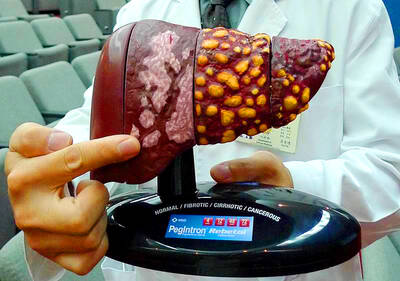Even though transitional justice is essential to reconciliation between ethnic groups in a post-authoritarian country like Taiwan, it should be achieved carefully to avoid causing new tensions, participants at a forum on the subject said yesterday.
"Reconciliation does not just come with democracy — let's take Switzerland and Belgium for example," Chien Hsi-chieh, executive director of the Peacetime Foundation of Taiwan, told the forum.
"Both countries are democratic, however, ethnic issues are still a big concern," Chien said. "In Belgium, conflicts between the French-speaking and the Flemish-speaking populations halted the formation of a government for months after elections."
A similar scenario exists in Taiwan — although it has completed a democratic transition, justice is yet to be done to victims of the decades-long Chinese Nationalist Party (KMT) dictatorship.
However mentioning transitional justice risks fanning ethnic tensions since the late dictator Chiang Kai-shek (蔣介石) is still regarded as a hero by most Mainlanders, he said.
"Many people view Chiang as the savior of the nation, but I only see him as a dictator," said Lin Shih-yu (林世煜), a member of the Truth and Reconciliation Promotion Association.
"Now that the KMT has returned to power, the biggest challenge to the movement for transitional justice — that [president-elect] Ma Ying-jeou (馬英九) has promised to support him — is to deal with differences in how various groups of people view Chiang," he said.
Chien suggested that the government should not try to achieve transitional justice itself.
Instead "the government should make the initiative, and leave the discussion to civil society, so that the two sides could reach an agreement through continuous dialogue," Chien said.
Former Democratic Progressive Party legislator Lee Wen-chung (李文忠) supported Chien's view, and pointed out a feasible direction.
"We may start transitional justice by dealing with less controversial and less political issues," Lee said. "A lot of former landlords had their lands confiscated during the Japanese colonial and the KMT authoritarian periods — we could begin by compensating them."
Lee suggested that Ma may consider not paying respects to Chiang Kai-shek and his son Chiang Ching-kuo (蔣經國) while president.
"I understand that Ma has a personal emotional attachment to Chiang Ching-kuo since Ma used to work for him and owes his success to him," Lee told the forum. "I'd fully support his decision to pay respects to the Chiangs as an individual — however, he should consider not doing so as a president.

The Taipei Summer Festival is to begin tomorrow at Dadaocheng Wharf (大稻埕), featuring four themed firework shows and five live music performances throughout the month, the Taipei Department of Information and Tourism said today. The festival in the city’s Datong District (大同) is to run until Aug. 30, holding firework displays on Wednesdays and the final Saturday of the event. The first show is scheduled for tomorrow, followed by Aug. 13, 20 and 30. To celebrate the 30th anniversary of Disney Pixar's movie Toy Story, the festival has partnered with Walt Disney Co (Taiwan) to host a special themed area on

Aftershocks from a magnitude 6.2 earthquake that struck off Yilan County at 3:45pm yesterday could reach a magnitude of 5 to 5.5, the Central Weather Administration (CWA) said. Seismological Center technical officer Chiu Chun-ta (邱俊達) told a news conference that the epicenter of the temblor was more than 100km from Taiwan. Although predicted to measure between magnitude 5 and 5.5, the aftershocks would reach an intensity of 1 on Taiwan’s 7-tier scale, which gauges the actual effect of an earthquake, he said. The earthquake lasted longer in Taipei because the city is in a basin, he said. The quake’s epicenter was about 128.9km east-southeast

BE CAREFUL: The virus rarely causes severe illness or death, but newborns, older people and those with medical conditions are at risk of more severe illness As more than 7,000 cases of chikungunya fever have been reported in China’s Guangdong Province this year, including 2,892 new cases last week, the Centers for Disease Control (CDC) yesterday said it is monitoring the situation and considering raising the travel notice level, which might be announced today. The CDC issued a level 1 travel notice, or “watch,” for Guangdong Province on July 22, citing an outbreak in Foshan, a manufacturing hub in the south of the province, that was reported early last month. Between July 27 and Saturday, the province reported 2,892 new cases of chikungunya, reaching a total of 7,716

STAY VIGILANT: People should reduce the risk of chronic liver inflammation by avoiding excessive alcohol consumption, smoking and eating pickled foods, the physician said A doctor last week urged people to look for five key warning signs of acute liver failure after popular producer-turned-entertainer Shen Yu-lin (沈玉琳) was reportedly admitted to an intensive care unit for fulminant hepatitis. Fulminant hepatitis is the rapid and massive death of liver cells, impairing the organ’s detoxification, metabolic, protein synthesis and bile production functions, which if left untreated has a mortality rate as high as 80 percent, according to the Web site of Advancing Clinical Treatment of Liver Disease, an international organization focused on liver disease prevention and treatment. People with hepatitis B or C are at higher risk of